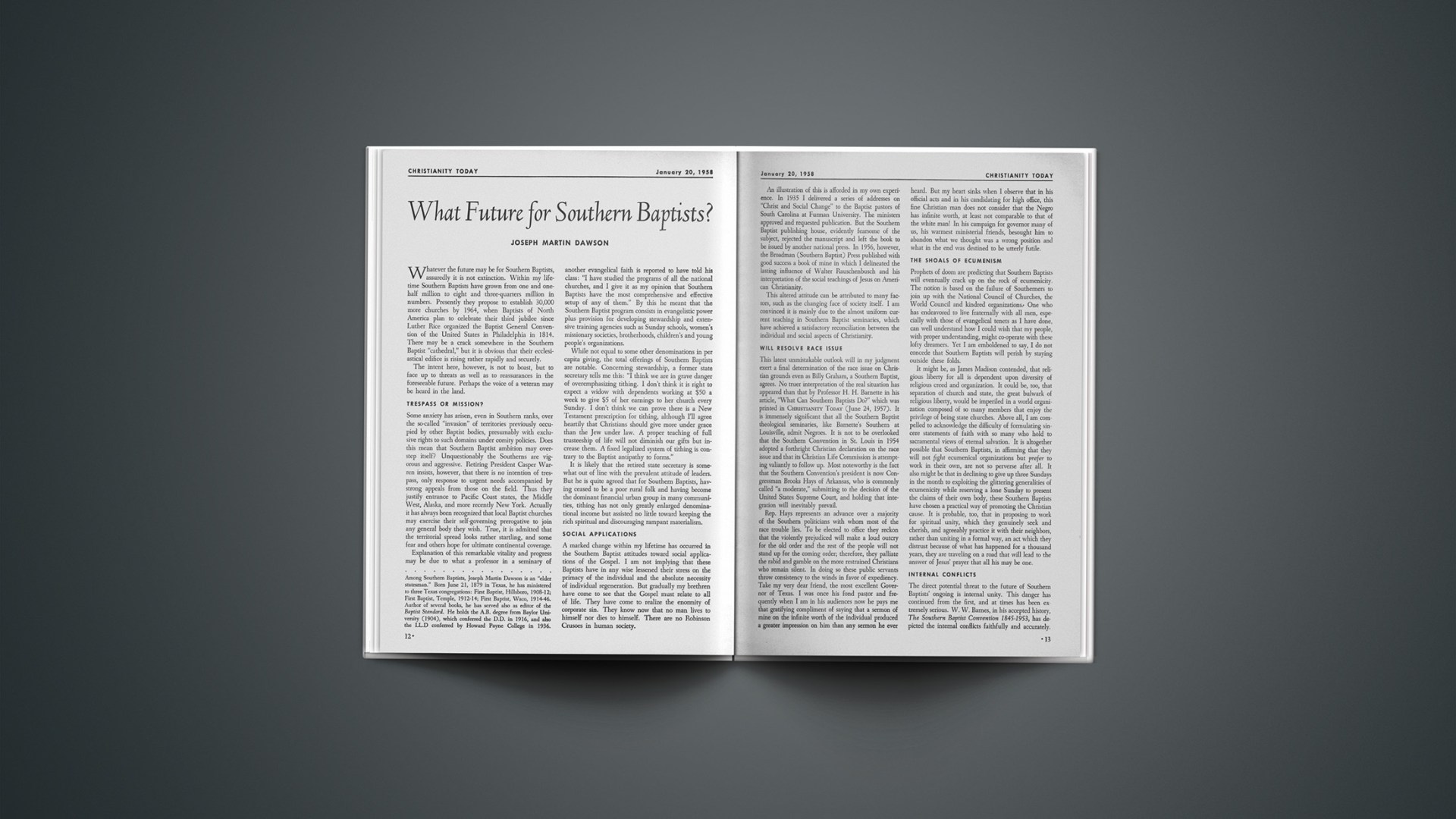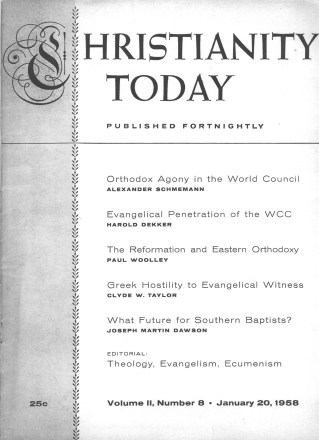Whatever the future may be for Southern Baptists, assuredly it is not extinction. Within my lifetime Southern Baptists have grown from one and one-half million to eight and three-quarters million in numbers. Presently they propose to establish 30,000 more churches by 1964, when Baptists of North America plan to celebrate their third jubilee since Luther Rice organized the Baptist General Convention of the United States in Philadelphia in 1814. There may be a crack somewhere in the Southern Baptist “cathedral,” but it is obvious that their ecclesiastical edifice is rising rather rapidly and securely.
The intent here, however, is not to boast, but to face up to threats as well as to reassurances in the foreseeable future. Perhaps the voice of a veteran may be heard in the land.
Trespass Or Mission?
Some anxiety has arisen, even in Southern ranks, over the so-called “invasion” of territories previously occupied by other Baptist bodies, presumably with exclusive rights to such domains under comity policies. Does this mean that Southern Baptist ambition may overstep itself? Unquestionably the Southerns are vigorous and aggressive. Retiring President Casper Warren insists, however, that there is no intention of trespass, only response to urgent needs accompanied by strong appeals from those on the field. Thus they justify entrance to Pacific Coast states, the Middle West, Alaska, and more recently New York. Actually it has always been recognized that local Baptist churches may exercise their self-governing prerogative to join any general body they wish. True, it is admitted that the territorial spread looks rather startling, and some fear and others hope for ultimate continental coverage.
Explanation of this remarkable vitality and progress may be due to what a professor in a seminary of another evangelical faith is reported to have told his class: “I have studied the programs of all the national churches, and I give it as my opinion that Southern Baptists have the most comprehensive and effective setup of any of them.” By this he meant that the Southern Baptist program consists in evangelistic power plus provision for developing stewardship and extensive training agencies such as Sunday schools, women’s missionary societies, brotherhoods, children’s and young people’s organizations.
While not equal to some other denominations in per capita giving, the total offerings of Southern Baptists are notable. Concerning stewardship, a former state secretary tells me this: “I think we are in grave danger of overemphasizing tithing. I don’t think it is right to expect a widow with dependents working at $50 a week to give $5 of her earnings to her church every Sunday. I don’t think we can prove there is a New Testament prescription for tithing, although I’ll agree heartily that Christians should give more under grace than the Jew under law. A proper teaching of full trusteeship of life will not diminish our gifts but increase them. A fixed legalized system of tithing is contrary to the Baptist antipathy to forms.”
It is likely that the retired state secretary is somewhat out of line with the prevalent attitude of leaders. But he is quite agreed that for Southern Baptists, having ceased to be a poor rural folk and having become the dominant financial urban group in many communities, tithing has not only greatly enlarged denominational income but assisted no little toward keeping the rich spiritual and discouraging rampant materialism.
Social Applications
A marked change within my lifetime has occurred in the Southern Baptist attitudes toward social applications of the Gospel. I am not implying that these Baptists have in any wise lessened their stress on the primacy of the individual and the absolute necessity of individual regeneration. But gradually my brethren have come to see that the Gospel must relate to all of life. They have come to realize the enormity of corporate sin. They know now that no man lives to himself nor dies to himself. There are no Robinson Crusoes in human society.
An illustration of this is afforded in my own experience. In 1935 I delivered a series of addresses on “Christ and Social Change” to the Baptist pastors of South Carolina at Furman University. The ministers approved and requested publication. But the Southern Baptist publishing house, evidently fearsome of the subject, rejected the manuscript and left the book to be issued by another national press. In 1956, however, the Broadman (Southern Baptist) Press published with good success a book of mine in which I delineated the lasting influence of Walter Rauschenbusch and his interpretation of the social teachings of Jesus on American Christianity.
This altered attitude can be attributed to many factors, such as the changing face of society itself. I am convinced it is mainly due to the almost uniform current teaching in Southern Baptist seminaries, which have achieved a satisfactory reconciliation between the individual and social aspects of Christianity.
Will Resolve Race Issue
This latest unmistakable outlook will in my judgment exert a final determination of the race issue on Christian grounds even as Billy Graham, a Southern Baptist, agrees. No truer interpretation of the real situation has appeared than that by Professor H. H. Barnette in his article, “What Can Southern Baptists Do?” which was printed in CHRISTIANITY TODAY (June 24, 1957). It is immensely significant that all the Southern Baptist theological seminaries, like Barnette’s Southern at Louisville, admit Negroes. It is not to be overlooked that the Southern Convention in St. Louis in 1954 adopted a forthright Christian declaration on the race issue and that its Christian Life Commission is attempting valiantly to follow up. Most noteworthy is the fact that the Southern Convention’s president is now Congressman Brooks Hays of Arkansas, who is commonly called “a moderate,” submitting to the decision of the United States Supreme Court, and holding that integration will inevitably prevail.
Rep. Hays represents an advance over a majority of the Southern politicians with whom most of the race trouble lies. To be elected to office they reckon that the violently prejudiced will make a loud outcry for the old order and the rest of the people will not stand up for the coming order; therefore, they palliate the rabid and gamble on the more restrained Christians who remain silent. In doing so these public servants throw consistency to the winds in favor of expediency. Take my very dear friend, the most excellent Governor of Texas. I was once his fond pastor and frequently when I am in his audiences now he pays me that gratifying compliment of saying that a sermon of mine on the infinite worth of the individual produced a greater impression on him than any sermon he ever heard. But my heart sinks when I observe that in his official acts and in his candidating for high office, this fine Christian man does not consider that the Negro has infinite worth, at least not comparable to that of the white man! In his campaign for governor many of us, his warmest ministerial friends, besought him to abandon what we thought was a wrong position and what in the end was destined to be utterly futile.
The Shoals Of Ecumenism
Prophets of doom are predicting that Southern Baptists will eventually crack up on the rock of ecumenicity. The notion is based on the failure of Southerners to join up with the National Council of Churches, the World Council and kindred organizations. One who has endeavored to live fraternally with all men, especially with those of evangelical tenets as I have done, can well understand how I could wish that my people, with proper understanding, might co-operate with these lofty dreamers. Yet I am emboldened to say, I do not concede that Southern Baptists will perish by staying outside these folds.
It might be, as James Madison contended, that religious liberty for all is dependent upon diversity of religious creed and organization. It could be, too, that separation of church and state, the great bulwark of religious liberty, would be imperiled in a world organization composed of so many members that enjoy the privilege of being state churches. Above all, I am compelled to acknowledge the difficulty of formulating sincere statements of faith with so many who hold to sacramental views of eternal salvation. It is altogether possible that Southern Baptists, in affirming that they will not fight ecumenical organizations but prefer to work in their own, are not so perverse after all. It also might be that in declining to give up three Sundays in the month to exploiting the glittering generalities of ecumenicity while reserving a lone Sunday to present the claims of their own body, these Southern Baptists have chosen a practical way of promoting the Christian cause. It is probable, too, that in proposing to work for spiritual unity, which they genuinely seek and cherish, and agreeably practice it with their neighbors, rather than uniting in a formal way, an act which they distrust because of what has happened for a thousand years, they are traveling on a road that will lead to the answer of Jesus’ prayer that all his may be one.
Internal Conflicts
The direct potential threat to the future of Southern Baptists’ ongoing is internal unity. This danger has continued from the first, and at times has been extremely serious. W. W. Barnes, in his accepted history, The Southern Baptist Convention 1845–1953, has depicted the internal conflicts faithfully and accurately. Looking backward they have been: (1) uncertainty as to authority, (2) theories of succession, (3) Landmarkism, (4) Gospel missionism and (5) statements of faith. I would add to this list: (6) East-West differences, (7) rivalry between boards and (8) disaffected leaders, often utilizing newspapers.
Fortunately, as of the present, not one of these apparently poses an actual menace. The fear of centralization of power, particularly in persons or agencies, has been largely dissipated, as more and more the actions of the Convention, a representative, deliberate body, purely advisory, without any authority over any local church, has come to be recognized generally and voluntarily. The degree to which co-operation has been taught and practiced is phenomenal. While there will always be murmurings that such co-operation is pressured, proof of it is difficult. The unity of so many in such distant sections with such pronounced local interests and accents seems miraculous—seemingly “a rope of sand” holding the democratic multitudes firmly together. I heard the late Senator Tobey tell a Congressional Foreign Relations Committee that there might be 57 varieties of Baptists, but they were all united in upholding religious liberty. From where I sit it looks to me that there may be an unimaginable number of disputants among Southern Baptists, but on essential beliefs and policies they all unite in sticking together in the final showdown.
Among Southern Baptists, Joseph Martin Dawson is an “elder statesman.” Born June 21, 1879 in Texas, he has ministered to three Texas congregations: First Baptist, Hillsboro, 1908–12; First Baptist, Temple, 1912–14; First Baptist, Waco, 1914–46. Author of several books, he has served also as editor of the Baptist Standard. He holds the A.B. degree from Baylor University (1904), which conferred the D.D. in 1916, and also the LL.D conferred by Howard Payne College in 1936.










